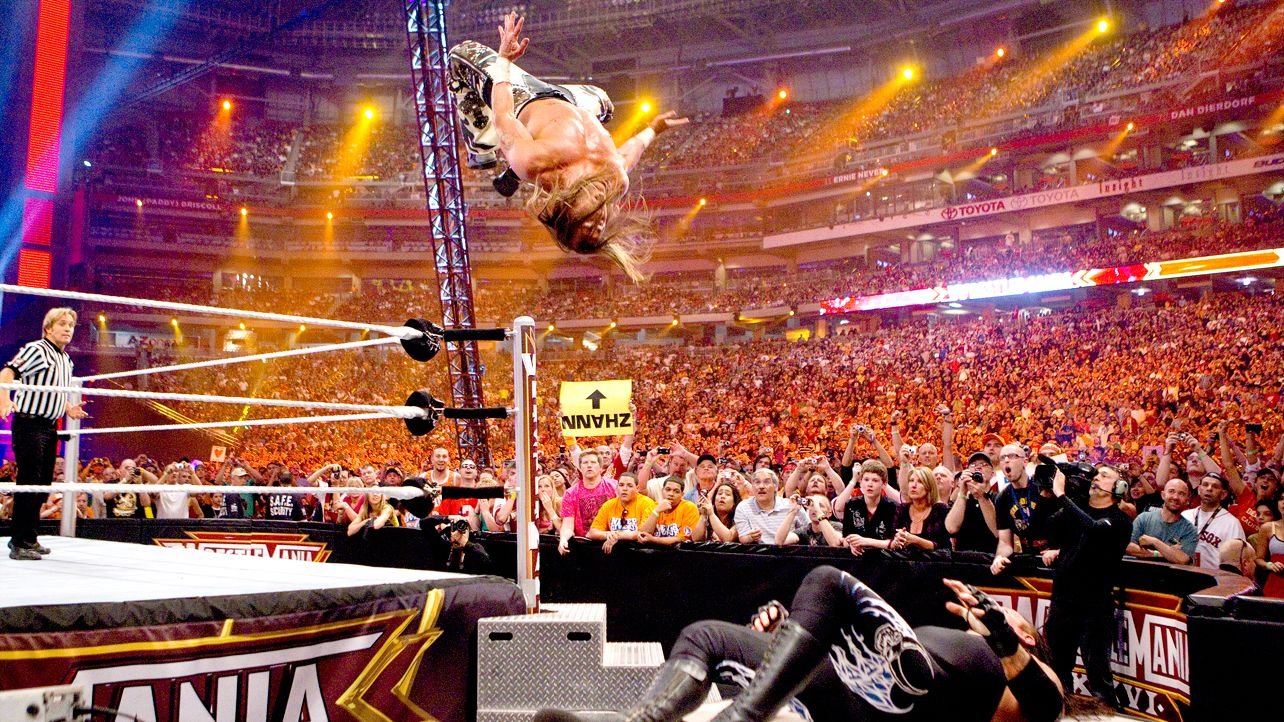Throughout my career, the Sunday evening work session has become a ritual. I sit down at about four o'clock and start prepping for the week ahead. For atmosphere, I usually have some combination of Law & Order, soccer, or wrestling in the background. Wrestling is actually perfect for productivity. You can focus on your task and mostly tune it out. The crowd and announcers will signal you to tune in for the chair shot, occasional shooting star press, or the finishing move. WrestleMania XXXIX happened last week at SoFi Stadium in LA, so it was my background this weekend.
Wrestling is theater. It’s a scripted soap opera (in tights) with feats of athleticism and risks that defy common sense. But for a person with my worldview, enjoying the product is complicated. You could build an encyclopedia of the racist and xenophobic gimmicks that have been used over the years (see below). Women’s bodies are habitually objectified. The people in charge of the two major promotions (AEW and WWE) are billionaires of questionable character, both born into wealth.
It goes deeper than that. If you look at their biographies, Donald Trump and Vince McMahon’s resumes are largely indistinguishable up until about 2015. Both inherited businesses from their fathers: Trump a real estate empire, McMahon the then WWF. Both spent much of their careers awash is scandal. McMahon was indicted in federal court in 1994, charged with providing steroids to wrestlers. He was forced to resign as chairman of WWE in 2022, after it came to light that he, like Trump, paid hush money to a mistress. Their lives are intertwined in other ways. Trump made several appearances in the WWE and was inducted into the WWE Hall of Fame in 2013 and McMahon’s wife served as a member of Trump’s Whitehouse, as administrator of the Small Business Administration.
They are basically the same dude and I find both loathsome. I wouldn’t want someone of their character as a colleague at work or representing me in public office.
Despite this I enjoy wrestling and can largely ignore its excesses because I understand it’s all an act. Everything is scripted, the animosity is a pantomime. The audience is mostly in on the joke. But increasingly, I find myself using the language of wrestling to describe our unfortunate period of American politics.
When I see conservative culture warriors attacking teachers or the LGBTQ+ community, I see heels generating cheap heat. A heel in wrestling parlance is a villain in a storyline and heat is the negative response they desire from the crowd—bad guys want crowds to boo them—they want to be hated. The “own the libs” aesthetic of the modern GOP is indistinguishable from a heel wrestling promo. Earning the scorn of the establishment, helps them get more over, the wrestling term for gaining popularity, with their base. Why else would we have politicians wearing AR15 pins into congress days after school shootings? It’s heel nonsense, meant to spark outrage.
The more we revile them, the more their supporters revere them.
The clip above is a masterclass in cheap heat, Elias earning deafening boos insulting a crowd in Seattle on Monday Night Raw in 2018.
The word kayfabe refers to the illusion that wrestling is real, unscripted—that it’s a competitive sport. When we puncture that veneer and address the sport as the scripted drama, we call it breaking kayfabe. The feigned outrages that rise up in our politics everyday feel like kayfabe. Look at events this week in Tennessee: two Black Democratic legislators were expelled from the House for breaking rules on decorum while participating in a protest against gun violence. Rep. Andrew Farmer, who has a voice that is simultaneously reminiscent of Foghorn Leghorn and a plantation owner, condemned their actions in this video.
Farmer, maintaining kayfabe, pretended to be outraged by the protest, treating it as an unprecedented breach of decorum. Rep. Justin Pearson, one of the expelled members, rightly called out the expulsion as what it was—a racially motivated power grab, overturning the will of voters in Memphis. Pearson’s response was a shoot, an unscripted breaking of kayfabe, bringing real life elements into the storyline. Pearson highlighted the hypocrisy of the GOP majority, expelling him while keeping people in the chamber accused of grave misconduct.
I’m already dreading the ever expanding 2024 campaign that is taking shape right now. Collectively we face a number of overlapping crises and find ourselves in serious times but have a deeply unserious political culture.
But for better or worse, I am an institutionalist. I believe in democratic institutions and that government can help solve problems and make society better. But I find myself caring less and less about US national politics as it becomes more and more like pro-wrestling.
I have more to say about wrestling and politics, in particular about how progressive politicians should embrace the populist message of Dusty Rhodes’s Hard Times promo. But that will have to wait until next week.





